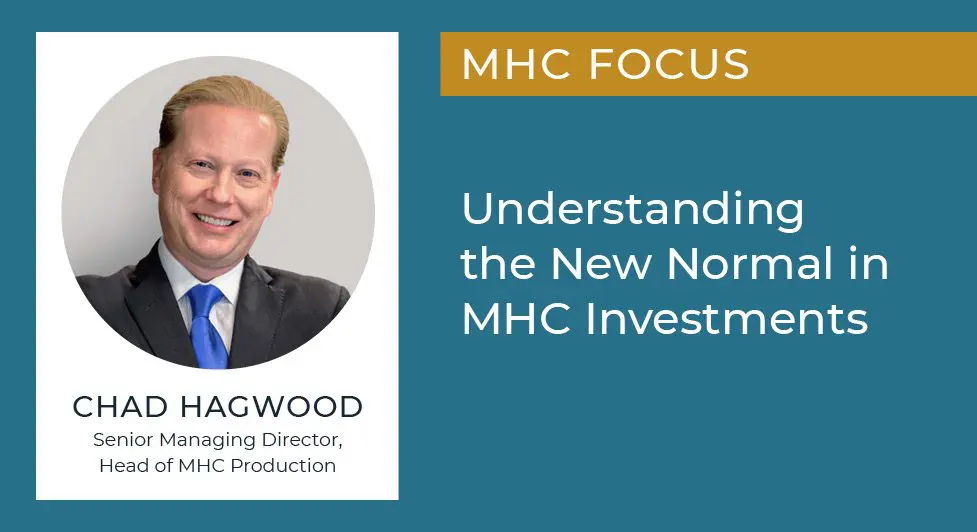This is part two of a six-part series on MHC insights and strategies by Chad Hagwood.
The manufactured housing (MHC) industry has evolved dramatically over the last two decades. The past few years alone have brought tremendous growth opportunities, new financing products, and other positives for MHC owners and investors.
What started as a relatively taboo investment model that was later institutionalized by the likes of industry pioneer Sam Zell has expanded into a diverse and competitive housing sector that mid-market owners and investors can tap for portfolio growth.
MHC investments also serve a vital and stable resident base, largely shaped by working-class families, retirees, and students. In today’s market, however, there are important fundamentals for MHC investors to consider—especially newer owners looking to enter the market.
As most signs indicate, interest rates are not falling anytime soon, inflation is not yet out of the picture, and a potential recession still looms over the U.S. economy. These factors could fuel further growth in the sector but also remain key considerations for multifamily investors on top of labor shortages and supply chain hurdles.
On the positive side, the West Coast, Sun Belt, and Northeast offer a growing number of deal opportunities. And at the same time, more financing options have become available to MHC owners—many more than were available just 10 years ago.
Here’s a closer look at this “new normal” for MHC investments and financing as of mid-2023.
Interest Rate and Inflation Expectations
Record low interest rates between the late 2010s and 2021 were a blessing for MHC and other real estate investors. They were also an anomaly. In taking the long view, today’s rate of roughly 6.00%+ could very well set the bar for years to come.
During the oil crises of the 1970s and the recession that followed in the 1980s, for instance, 30-year fixed mortgage rates went into the double digits and peaked at more than 18% in 1981. As recently as the mid-1990s, interest rates for permanent loans for MHC owners were in the double digits.
Several factors influence mortgage rates for MHC acquisition and refinancing deals today, including buzz emanating from Federal Reserve calls, inflation levels, the overall economy, and the performance of individual owner portfolios. Inflation impacts us all and should be measured appropriately, including how it affects everyone from low-income residents to equity partners.
MHC loan products Fannie Mae and Freddie Mac offer include compliance rules, such as acceptable rent increases, lease renewal terms, and eviction protocols. If the U.S. experiences an economic downturn shortly, these rules—combined with federal, state, and local measures—could play a larger role.
Many economists believe the U.S. can continue to outrun a recession, though most forecasts indicate that the country will need to wait until 2024 to know for sure.
Looking ahead, the MHC sector is expected to hold strong and act as a safe harbor for many tenants and investors alike. While nobody likes where inflation and interest rates are compared to two years ago, the nuances of park underwriting and operations are still very favorable in mid-2023.
Best Debt Options for MHC Investments
Loan-to-value ratios and available financing options are also important considerations for MHC owners in today’s market environment.
Fannie and Freddie both offer MHC financing products that can range from under $10 million to more than $75 million with a maximum LTV of 80%. The experienced team at Lument is able to close MHC financing deals in 45 days or less in many cases.
A handful of non-agency lenders also offer loan products for MHCs, including CMBS debt, a few life companies and conventional bank loans. Of course, some lenders have a greater appreciation for manufactured housing financing than others.
In most cases, leverage and the cost of financing will depend on a borrower’s track record and the property or portfolio’s cap rate and occupancy.
Economic conditions going forward will impact the amount of debt that lenders are willing to digest and the availability of financing options for less seasoned MHC borrowers.
New Opportunities in a Competitive Market
The MHC market has made leaps and strides in recent years, opening the gates for a wider range of investor classes.
Manufactured housing is still among the most affordable housing options in the U.S. and one of the most stable real estate investment opportunities.
But as investor demand for MHC properties rises, so do asset values. The average sale price of a manufactured home in the U.S. was pegged at $128,000 in February 2023, up from about $85,000 in 2020, according to Census data. Average lot rents have been on the rise as well.
Now as more institutional investors pounce on MHC deals, entrepreneurial owners need to know which markets have the greatest upside potential and what investment and financing strategies best apply in this increasingly competitive sector.
Small and mid-market owners looking to explore new investment and financing opportunities should contact the MHC experts at Lument today and stay tuned for more insights on the MHC market.

